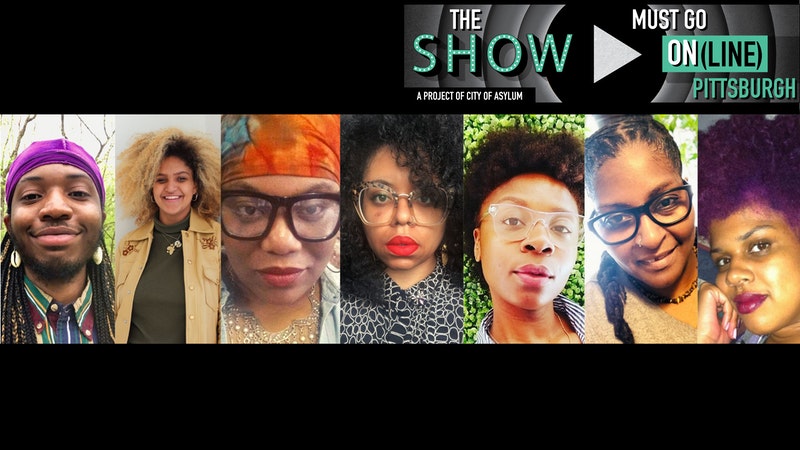Poetry Partnership elevates voices of Black poets
Courtesy of City of Asylum Pittsburgh
The final community reading of the Poetry Partnership of Pittsburgh streamed last Wednesday.
June 16, 2020
In the virtual waiting room, about 100 people wait for the digital curtains to go up. There are plenty of heart emojis and warm welcomes to go around, but when the audio finally clicks in, the spam of love is almost too fast to read.
All these reactions were for the final community reading of the Poetry Partnership of Pittsburgh, a four-month-long workshop for poets of color created by the Black Unicorn Library and Archives Project and Pitt’s Center for African and African American Poetry and Poetics. The reading was livestreamed last Wednesday, in collaboration with City of Aslyum’s The Show Must Go On(line), an online platform for City artists.
The reading featured 10 poets reading their work — Joss Green, Diarra Imani, Dani Janae, Medina Jackson, Maria Kent, Joy KMT, Crystal Massie, Tresa Murphy Green, Christina Springer and Jahqwahn Watson.
Much of the subject matter revolved around themes of womanhood, motherhood, Black ancestry and what it means to be Black today in the United States. Bekezela Mguni, the founder of Black Unicorn, said although poems about George Floyd and Black Lives Matter might have caught people’s attention, other poems were about more than current events — they presented a varied and multilayered subject of Blackness.
“I did hear of course themes that speak to what’s happening now, but these are things that have been happening for generations for a very long time,” she said. “There was also just a lot of beauty, magic, sweetness and power in the space and in their work [Wednesday] night too.”
Though PPP had adapted workshops to an online format via Zoom and Google Hangouts, it initially planned this final community reading to be in person. Mguni said when City of Asylum approached the team about doing the event online to a larger audience, it was an opportunity PPP could not pass up.
“I was so happy, I mean, there were 144 people hearing this awesomeness,” Mguni said. “I feel like we exceeded some expectations and it worked in our favor. The timing and stuff was just right.”
The poems had been in the works since January, when the workshop met weekly at the Carnegie Library of Pittsburgh in the Hill District. They soon had to abandon their meeting spot when the COVID-19 pandemic hit, but this didn’t stop the workshop from continuing. Justin Phillip Reed, a National Book Award-winning poet, said PPP served first and foremost as a community place, no matter whether in person or online.
“It was difficult, we would never minimize that, everybody had something going on,” Reed, a CAAPP creative writing fellow, said. “Instead of it being a class where people feel compelled to show up, we wanted it as an offering in case folks needed some continuity or needed to have that community it offered.”
Lauren Russell, the assistant director of CAAPP, said it was impactful hearing the final renditions of the poems last Wednesday, as they encompass such a broad spectrum of different Black experiences.
“It’s because of the diversity of approaches and experiences,” Russell said. “The different ways of experiencing poetry and life, different aesthetics and interests and backgrounds.”
Green, an event organizer and one of the poets who presented, said a goal of PPP was to gather Black and brown poets together who specifically don’t practice poetry in an academic space. She said PPP allowed poets to hone their skills in a safe space, with other artists similar to them who may not want or be able to practice poetry in the way academics often teach it.
“It was really just for community members, people who don’t have access to academia, access to classrooms and all of that,” Green said. “Also just [for] people, particularly Black folks in search of other Black poets.”
Reed said institutionalized ways of teaching are often prioritized. Instead, he said, there should be more of an open conversation between the community and academia about what they can accomplish together.
“I think another part of the goal too was to shift the perspective and stop privileging university and academic ways of approaching craft all the time,” Reed said.
But PPP aimed to do more than challenge academia, Mguni said. By holding workshops like PPP, poets can honor and further the legacy of Pittsburgh’s local Black artistic community, such as the late Vernell Lillie — a giant of Black theater in Pittsburgh and former Africana Studies professor at Pitt.
“There’s so much richness in Pittsburgh’s community that we don’t want to forget. We also want to invest in people and cultivate spaces that support their creative work and expression,” Mguni said. “We’re a part of a legacy and we have a commitment and responsibility to that.”
Mguni added that putting all different types of Black experiences into poetry was something she explicitly wanted to be heard.
“Black people aren’t monolithic. We’re all experiencing full and complex lives. We shouldn’t be reduced to one experience or one perspective of an experience,” she said.
Green said though PPP was only created recently, it has a promising future to provide a space to lift up the voices of Black and brown poets in Pittsburgh and put prose to their experiences.
“It was a beautiful, beautiful experience, the whole workshop. Speaking as a participant, we need this. We really do. It’s such a rare space, my heart, that’s how I feel about PPP.”
Editor’s Note: A previous version of the story said only the event organizers met weekly at the Carnegie Library. All poets involved in the workshop attended these meetings. The article has been updated to reflect this change. The Pitt News regrets this error.



